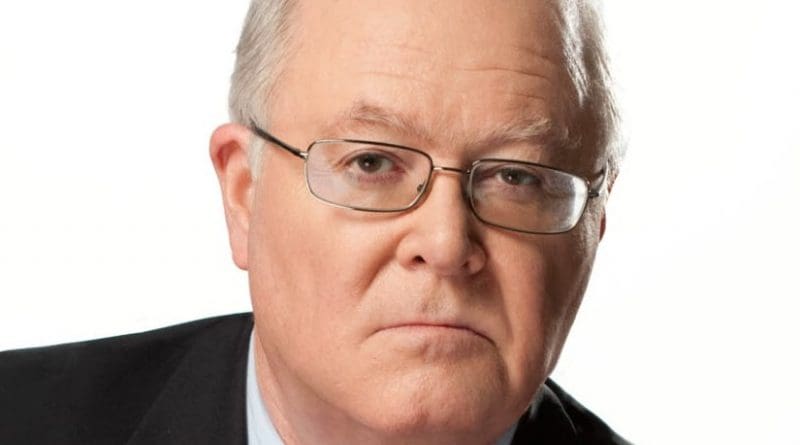The Meaning Of Linguistic Politics – OpEd
The left has always been convinced that they have some gnostic calling, often manifested in utopian ideas, to change society. That is why they have no ethical problem imposing their beliefs on society. What drives them is an insatiable appetite for power: They want to control the way we think and act.
The meaning of linguistic politics is thought control. Its purpose is to get people to adopt a new mindset, one that mirrors the politics of elites. The consequences are far reaching. Those who control our words control our thoughts, and our thoughts influence our behavior. They know what they are doing. Today’s brand of journalists and educators are masterful practitioners of thought control. They are convinced that it is their job to have us talk the talk. Their talk.
In the 1980s, I remember a faculty colleague of mine who objected to what someone said, though he did not take issue with the content of what was said. He objected to the “negative” phrasing. At the time I thought what he said was strange. No longer—I’m used to it. Indeed, not a day goes by without Orwell being validated.
The Associated Press (AP) publishes a stylebook that is used by many journalists, inside and outside of AP. Its 55th edition, 2020-2022, contains more than 200 new and revised entries. Among the changes are calling the homeless “people without homes” or “people without housing.” To call them “homeless,” the linguistic masters insist, is “dehumanizing.” We must rid our vocabulary of such terms as “insane,” “crazy/crazed,” “nuts” or “deranged.” The elites have determined that these words are “derogatory.” Similarly, we should not use the term “defund the police,” and that is because it “is sometimes misrepresented as abolishing police.”
So what should we say when those who explicitly demand the abolition of the police endorse defunding the police? The masters do not say.
Under the Biden administration, customs and immigration agents are no longer allowed to call illegal aliens by their proper name. What is even more bizarre, they cannot call them “undocumented aliens.” So what should we call those who crash our borders? “Undocumented noncitizen.” Also, we cannot speak about assimilation anymore: We must use the word “integration.”
Homosexual activists are very good at promoting thought control. They are still harassing Jack Phillips, the Christian owner of Masterpiece Cake Shop.
He has never turned down a customer who wanted to buy one of his cakes on the basis of the person’s race, ethnicity, religion, sex, sexual orientation, and the like. Everyone is treated equally. But when Phillips was asked to make a cake celebrating the “marriage” of two men, he refused. Had he done so he would have sanctioned behavior he could not in good conscience accept. He was sued; he won in the U.S. Supreme Court. Now he is back in Colorado courts again, this time because he refused to custom a cake celebrating someone’s sex transitioning.
The campuses are alive with invoking punitive measures against students who dare to challenge the reigning linguistic politics. “If I’m a man, and I think I’m a woman, I’m still a man. If I’m a woman who thinks I’m a man, I’m still a woman.” As recently as 20 years ago, no one would have regarded this as anything but commonsensical. Now it’s controversial. The student who said this was suspended at the State University of New York Genesco.
CNN recently showed its brilliance when it declared that “it’s not possible to know a person’s gender identity at birth, and there is no consensus criteria for assigning sex at birth.” This is a remarkable statement. Are the deep thinkers at CNN aware that the sex of the baby can be known while he is developing in his mother’s womb? Moreover, no one is ever “assigned” his or her sex—it is determined by the father and acknowledged by hospital employees.
These instances demonstrate that linguistic politics is very much an expression of postmodernism. To be exact, it is a frontal assault on truth. Educators are its most rabid advocates.
I recall a meeting of the academic senate at the college where I worked where one of the faculty members took umbrage at the idea that there was such a thing as “correct” spelling. He called it “logocentrism.” I looked around the room and noted that some of my colleagues appeared to agree with him. I then asked if he would object if the finance office were to issue his paycheck with his name and address scrambled. Only a few of us thought it was funny.
Now there are educators in California who insist that there is no such thing as “correct” math,” saying it is “racist” to think otherwise. Perhaps we can scramble the numbers in their paycheck as well, the first numeric being a zero.
The more the masters of linguistic politics push, the more we need to push back. We have common sense on our side. More important, we have truth on our side.


The irony must be lost on Mr. Donahue, as his entire argument is based on his desire to use “his talk” to define others and thrust his world view ahead. Everyone is free to their ideas and thoughts, but not immune from criticism for expressing them. Ironically, if we follow Mr. Donahue’s logic and argument, he is attempting to suppress “the left” for expressing themselves in manner’s he disagrees with.
The truth is lost on him when it comes to sex and biology. In truth, sex is not binary and not everyone’s sex is easily determined by looking at their genetics. A quick google search of “intersex” people will educate anyone actually interested in “truth” and not Mr. Donahue’s attempts at a “linguistic politics push.”